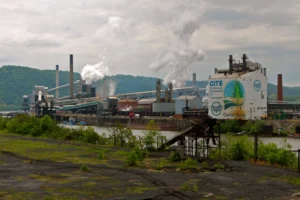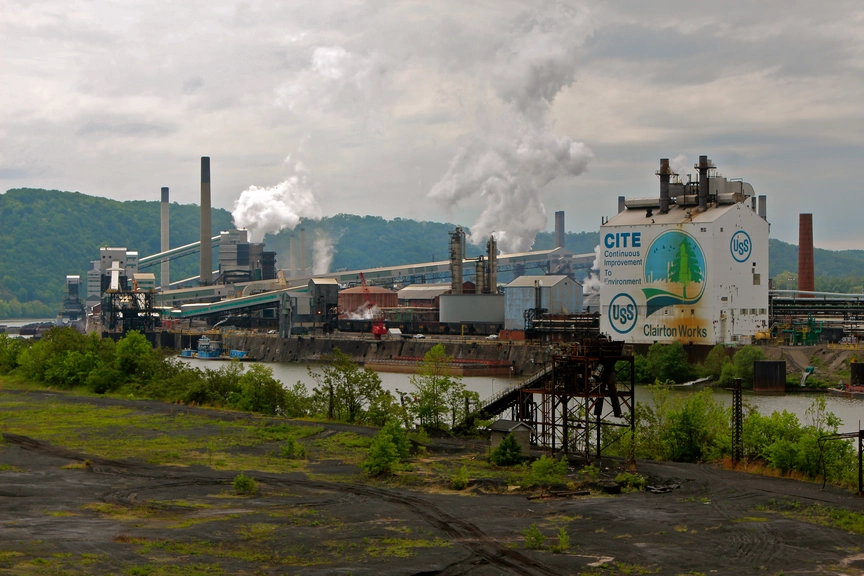Clairton Coke Works: A Pillar of the Steel Industry
Clairton Coke Works, located in Clairton, Pennsylvania, is a significant player in the steel industry, particularly known for its role in coke production. As one of the largest coke plants in the United States, it has been a vital part of the region’s industrial landscape for decades. This article will explore the history, operations, environmental impact, and future of Clairton Cokhttp://en.wikipedia.org/wiki/Clairton_Coke_Workse Works, shedding light on its importance to both the local community and the broader steel industry.
Historical Background
The history of Clairton Coke Works dates back to the early 20th century when the demand for steel surged due to industrialization and the growth of the American economy. http://en.wikipedia.org/wiki/Clairton_Coke_Works The plant was established in 1886 by the Pittsburgh Steel Company, primarily to produce coke, a crucial ingredient in the steel-making process. Over the years, Clairton Coke Works expanded its operations, becoming a key supplier of coke to various steel mills in the region.

Throughout the 20th century, the plant underwent several changes in ownership and management. It was acquired by U.S. Steel in the 1980s, which further solidified its position as a leading coke producer. The plant’s strategic location along the Monongahela River allowed for efficient transportation of raw materials and finished products, contributing to its growth and success.
As the steel industry evolved, Clairton Coke Works adapted to changing market demands and technological advancements. The plant implemented new processes and equipment to enhance efficiency and reduce emissions, reflecting a commitment to sustainability and environmental responsibility. This adaptability has been crucial in maintaining its relevance in an ever-changing industrial landscape.
Operations and Production
Clairton Coke Works operates as a large-scale facility dedicated to the production of coke from coal. The process begins with the carbonization of coal in large ovens, where it is heated to high temperatures in the absence of air. This process removes volatile compounds, resulting in a solid carbon material known as coke. The coke produced at Clairton is primarily used in blast furnaces for steel production, making it an essential component of the steel-making process.
The plant’s production capacity is impressive, with the ability to produce millions of tons of coke annually. This output not only supports local steel mills but also contributes to the national steel supply. Clairton Coke Works employs advanced technologies to optimize production efficiency and minimize waste, ensuring that it remains competitive in the global market.
In addition to coke production, Clairton Coke Works also engages in byproduct recovery. The plant captures and processes gases released during the coking process, converting them into valuable byproducts such as ammonia, tar, and benzene. These byproducts are utilized in various industries, further enhancing the plant’s economic viability and sustainability.
Economic Impact on the Community
The economic impact of Clairton Coke Works on the local community cannot be overstated. The plant provides hundreds of jobs, offering stable employment opportunities for residents in Clairton and the surrounding areas. Many families have relied on the plant for generations, creating a strong sense of community and pride in the local workforce.
Beyond direct employment, Clairton Coke Works also supports local businesses and services. The plant’s operations generate demand for various goods and services, from transportation and logistics to maintenance and supply chain management. This ripple effect contributes to the overall economic health of the region, fostering growth and development.
Moreover, Clairton Coke Works has been involved in community initiatives and outreach programs. The plant has partnered with local organizations to support education, health, and environmental initiatives, demonstrating its commitment to being a responsible corporate citizen. These efforts help strengthen the bond between the plant and the community, ensuring that both can thrive together.
Environmental Considerations
While Clairton Coke Works plays a vital role in the steel industry and local economy, it is not without its environmental challenges. The coking process generates emissions, including volatile organic compounds (VOCs), sulfur dioxide, and particulate matter. These emissions can have adverse effects on air quality and public health, raising concerns among residents and environmental advocates.
In response to these challenges, Clairton Coke Works has implemented various measures to reduce its environmental footprint. The plant has invested in advanced pollution control technologies, such as scrubbers and filters, to capture and minimize emissions. Additionally, ongoing monitoring and reporting ensure compliance with environmental regulations and standards.
The plant’s commitment to sustainability extends beyond emissions reduction. Clairton Coke Works has also focused on energy efficiency and waste reduction. By optimizing production processes and utilizing byproducts, the plant aims to minimize its overall environmental impact while maintaining its operational efficiency.
Community engagement is another critical aspect of Clairton Coke Works’ environmental strategy. The plant actively collaborates with local stakeholders to address concerns and promote transparency. Regular communication and outreach efforts help build trust and foster a collaborative approach to environmental stewardship.
Challenges and Future Outlook
Despite its successes, Clairton Coke Works faces several challenges as it navigates the complexities of the modern steel industry. Fluctuating market demands, competition from alternative materials, and increasing regulatory pressures pose significant hurdles. Additionally, the ongoing transition to greener technologies and practices in the steel industry presents both challenges and opportunities for the plant.
To remain competitive, Clairton Coke Works is exploring innovative solutions and technologies. The plant is investing in research and development to enhance its production processes and reduce emissions further. By embracing new technologies, Clairton Coke Works aims to position itself as a leader in sustainable coke production.
The future of Clairton Coke Works will also depend on its ability to adapt to changing market dynamics. As the steel industry evolves, the plant must remain agile and responsive to emerging trends. This may involve diversifying its product offerings or exploring new markets to ensure long-term viability.
Moreover, Clairton Coke Works is committed to fostering a culture of safety and sustainability. By prioritizing the well-being of its employees and the community, the plant aims to create a positive work environment and contribute to the overall quality of life in the region. This commitment to safety and sustainability will be crucial as the plant navigates the challenges ahead.
Community Engagement and Corporate Responsibility
Clairton Coke Works recognizes the importance of community engagement and corporate responsibility. The plant actively seeks to build strong relationships with local residents, organizations, and stakeholders. Through open communication and collaboration, Clairton Coke Works aims to address community concerns and contribute positively to the region.
The plant has established various outreach programs focused on education, health, and environmental initiatives. These programs aim to empower local residents and promote awareness of important issues. By investing in the community, Clairton Coke Works demonstrates its commitment to being a responsible corporate citizen.
Additionally, the plant encourages employee involvement in community service and volunteer activities. Employees are often given opportunities to participate in local events and initiatives, fostering a sense of pride and connection to the community. This engagement not only benefits the community but also enhances employee morale and job satisfaction.
Clairton Coke Works also collaborates with local schools and educational institutions to support workforce development. By providing internships, scholarships, and training programs, the plant helps prepare the next generation of workers for careers in the steel and manufacturing industries. This investment in education reflects Clairton Coke Works’ commitment to the long-term success of both the community and the industry.
The Role of Technology in Operations
Technology plays a crucial role in the operations of Clairton Coke Works. The plant has embraced advanced technologies to enhance production efficiency, improve safety, and reduce environmental impact. From automation and data analytics to cutting-edge pollution control systems, technology is at the forefront of Clairton Coke Works’ operations.
One of the key technological advancements at Clairton Coke Works is the implementation of real-time monitoring systems. These systems allow for continuous tracking of emissions, production metrics, and equipment performance. By leveraging data analytics, the plant can identify areas for improvement and optimize its operations accordingly.
Automation has also transformed various aspects of the coking process. Automated systems help streamline production, reduce labor costs, and enhance safety by minimizing human exposure to hazardous conditions. This integration of technology not only improves efficiency but also contributes to a safer work environment for employees.
Furthermore, Clairton Coke Works is exploring innovative approaches to energy management. The plant is investigating renewable energy sources and energy-efficient technologies to reduce its reliance on fossil fuels. By embracing sustainable energy practices, Clairton Coke Works aims to align its operations with the growing demand for environmentally friendly solutions in the steel industry.
The Importance of Coke in Steel Production
Coke plays a vital role in the steel-making process, serving as a crucial ingredient in the production of iron and steel. The carbon content in coke provides the necessary heat and reducing agent for the chemical reactions that occur in blast furnaces. Without coke, the steel industry would struggle to meet the demands of modern construction, manufacturing, and infrastructure development.
Clairton Coke Works is dedicated to producing high-quality coke that meets the stringent requirements of steel manufacturers. The plant’s commitment to quality control ensures that the coke produced is consistent and reliable, making it a preferred choice for steel mills in the region. This focus on quality has helped Clairton Coke Works establish long-term partnerships with key customers in the steel industry.
In addition to its role in steel production, coke has various applications in other industries. It is used in the production of chemicals, fertilizers, and even in the manufacturing of carbon electrodes. This versatility further underscores the importance of Clairton Coke Works and its contributions to the broader economy.
As the steel industry continues to evolve, the demand for coke remains strong. Clairton Coke Works is well-positioned to meet this demand, thanks to its extensive experience, advanced technologies, and commitment to quality. The plant’s ability to adapt to changing market conditions will be crucial in ensuring its continued success in the years to come.
Conclusion
Clairton Coke Works stands as a pillar of the steel industry, playing a vital role in coke production and supporting the local economy. With a rich history, impressive production capabilities, and a commitment to sustainability, the plant has established itself as a leader in the field. While challenges remain, Clairton Coke Works is poised to navigate the complexities of the modern steel industry, embracing innovation and community engagement along the way.
As the plant looks to the future, its dedication to quality, environmental responsibility, and corporate citizenship will be key to its continued success. Clairton Coke Works not only contributes to the steel industry but also plays a significant role in the lives of the people in the surrounding community. With a focus on collaboration and sustainability, the plant is well-equipped to thrive in an ever-changing industrial landscape.



